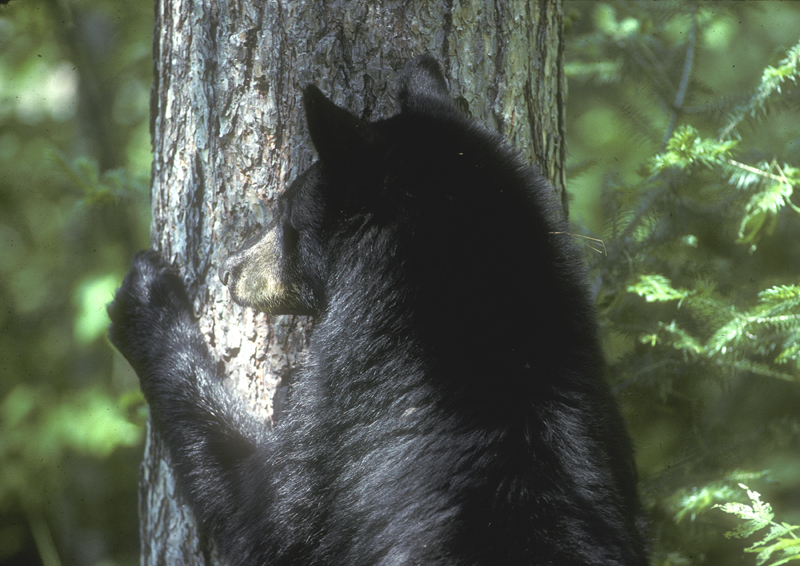Black bears are iconic symbols of the wilderness, often romanticized for their strength and resilience. However, beneath this rugged exterior lies a surprisingly timid creature. Why are black bears so timid? This question has intrigued wildlife enthusiasts and researchers alike, leading to a deeper understanding of these fascinating animals.
This article delves into the multifaceted reasons behind black bear timidity, exploring their natural instincts, sensory capabilities, and social behavior. We’ll uncover how these factors contribute to their elusive nature and highlight the importance of respecting their space in the wild.
Black Bear Behavior
Black bears are omnivores with a diverse diet consisting of berries, nuts, insects, fish, and occasionally small mammals. Their foraging habits often lead them into human-populated areas, creating opportunities for encounters. However, despite their proximity to humans, black bears generally avoid direct contact. They possess an innate understanding of potential dangers and prioritize their safety above all else.
Black bears are highly adaptable creatures, capable of thriving in a variety of habitats, from dense forests to mountainous regions. Their agility and climbing skills allow them to navigate complex terrain with ease. They are also known for their intelligence and problem-solving abilities, often devising ingenious methods to access food sources.
Shy Nature of Black Bears

The shy nature of black bears is deeply ingrained in their evolutionary history. As prey animals, they have developed a strong survival instinct that compels them to avoid confrontation whenever possible. This innate timidity manifests itself in various behaviors, such as retreating at the first sign of danger, maintaining a safe distance from humans, and avoiding noisy or crowded areas.
Black bears are not inherently aggressive creatures, but they will defend themselves if threatened or cornered. However, these instances are rare, and black bears typically prefer to avoid conflict altogether. Their shy nature is a testament to their wisdom and understanding of the delicate balance between predator and prey.
Senses and Threat Detection
Black bears possess an exceptional sense of smell, which plays a crucial role in their survival. They can detect potential threats from miles away, allowing them to avoid dangerous situations before they arise. This keen olfactory sense enables them to identify food sources, locate mates, and even recognize familiar individuals within their territory.
In addition to their powerful sense of smell, black bears also have excellent hearing and vision. Their large ears are sensitive to subtle sounds, while their eyes provide a wide field of view, allowing them to scan their surroundings for potential danger. These heightened senses work in concert to create a comprehensive awareness of their environment, ensuring their safety and well-being.
Solitary Lifestyle

Black bears are primarily solitary creatures, except during mating season or when mothers are raising their cubs. This solitary nature contributes to their shy demeanor as they are not accustomed to interacting with other individuals frequently. They prefer to establish their own territories and maintain a safe distance from others.
This independent lifestyle allows them to focus on foraging, resting, and raising their young without the distractions of social interactions. While black bears may occasionally encounter each other, these encounters are typically brief and non-confrontational.
Avoiding Confrontation
Black bears have evolved a remarkable ability to avoid confrontation. When they sense danger, they will often retreat quickly and silently, disappearing into the undergrowth or scaling trees with ease. They understand that direct conflict with humans or larger predators can be detrimental to their survival.
This avoidance behavior is a testament to their intelligence and understanding of the risks involved in engaging with potential threats. By prioritizing safety and minimizing contact, black bears ensure their continued existence in a world where human activity increasingly encroaches upon their natural habitats.
Conclusion
The timidity of black bears is a complex phenomenon rooted in their evolutionary history, sensory capabilities, and social behavior. Their innate instincts prioritize safety and avoidance of confrontation, leading them to flee from humans whenever possible. Their exceptional sense of smell allows them to detect potential threats from afar, while their solitary lifestyle reduces their inclination towards aggressive behavior. Understanding these factors is crucial for fostering a respectful coexistence with black bears in the wild. By appreciating their shy nature and adhering to safety guidelines, we can ensure that these magnificent creatures continue to thrive in their natural habitats.



